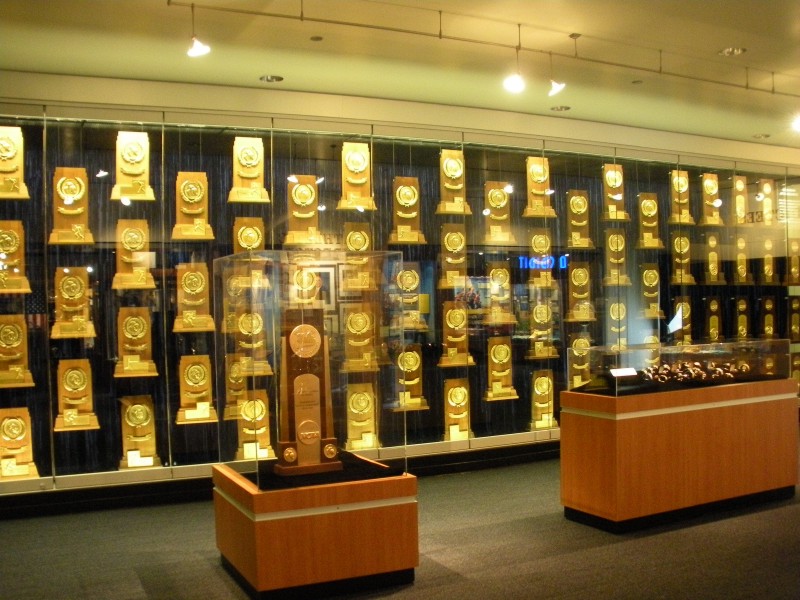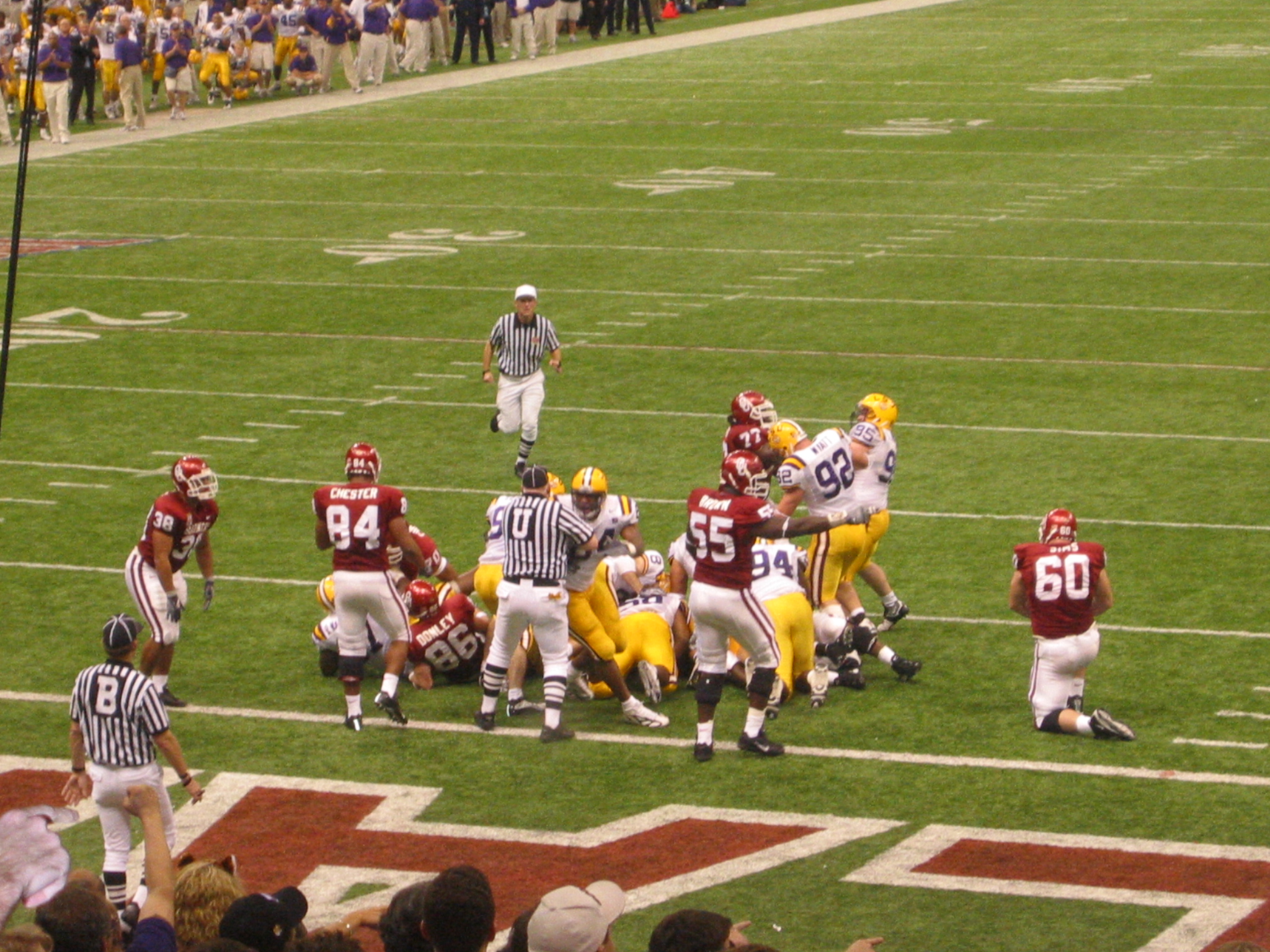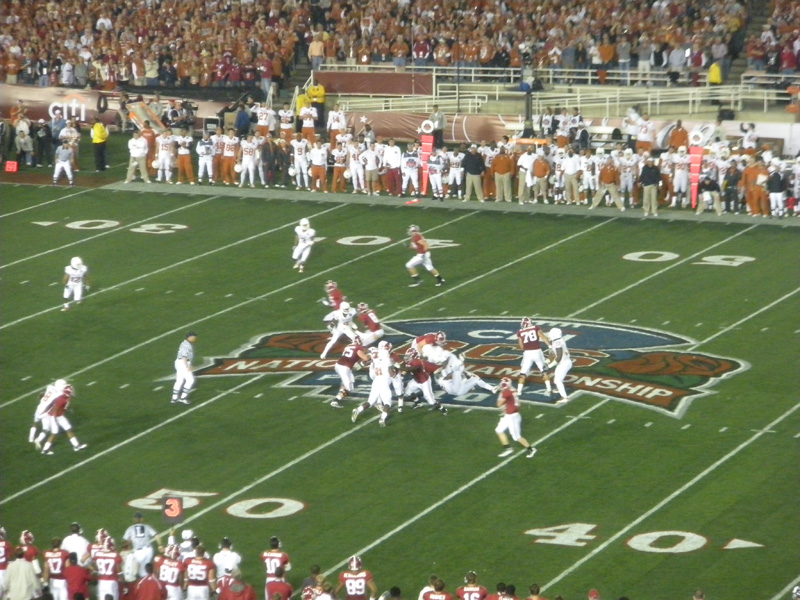|
2004 Rose Bowl
The 2004 Rose Bowl was a college football bowl game held on January 1, 2004 at the Rose Bowl in Pasadena, California. It was the 90th Rose Bowl Game. The USC Trojans, champions of the Pacific-10 Conference, defeated the Michigan Wolverines, champions of the Big Ten Conference, 28-14. USC quarterback Matt Leinart was named the Rose Bowl Player of the Game. The events leading up to the 2004 Rose Bowl were the subject of controversy. Although USC was ranked #1 in both the AP Poll and the Coaches Poll, the Trojans finished #3 in the final BCS standings due to a weaker schedule and one defeatto unranked Californiaduring the regular season, and thus did not qualify to go the BCS National Championship Game, played in the 2004 Sugar Bowl. Meanwhile, the Oklahoma Sooners played a stronger schedule in their undefeated regular season, but lost on December 5, 2003 in the 2003 Big 12 Championship Game to the #8-ranked Kansas State Wildcats. By virtue of their dominance through the entire reg ... [...More Info...] [...Related Items...] OR: [Wikipedia] [Google] [Baidu] |
Pacific-10 Conference
The Pac-12 Conference is a collegiate athletic conference, that operates in the Western United States, participating in 24 sports at the NCAA Division I level. Its football teams compete in the Football Bowl Subdivision (FBS; formerly Division I-A), the highest level of college football in the nation. The conference's 12 members are located in the states of Arizona, California, Colorado, Oregon, Utah, and Washington. They include each state's flagship public university, four additional public universities, and two private research universities. The modern Pac-12 conference formed after the disbanding of the Pacific Coast Conference (PCC), whose principal members founded the Athletic Association of Western Universities (AAWU) in 1959. The conference previously went by the names Big Five, Big Six, Pacific-8, and Pacific-10. The Pac-12 moniker was adopted in 2011 with the addition of Colorado and Utah. Nicknamed the "Conference of Championships", the Pac-12 has won more NCAA na ... [...More Info...] [...Related Items...] OR: [Wikipedia] [Google] [Baidu] |
2003 NCAA Division I-A Football Rankings
Two human polls and one formulaic ranking make up the 2003 NCAA Division I-A football rankings. Unlike most sports, college football's governing body, the National Collegiate Athletic Association (NCAA), does not bestow a National Championship title for Division I-A football. That title is primarily bestowed by different polling agencies. There are several polls that currently exist. The main weekly polls are the AP Poll and Coaches Poll. About halfway through the season the Bowl Championship Series (BCS) standings are released. Legend AP Poll Coaches Poll BCS standings The Bowl Championship Series (BCS) determined the two teams that competed in the BCS National Championship Game, the 2004 Sugar Bowl The 2004 Nokia Sugar Bowl, the BCS National Championship Game for the 2003 college football season, was played on January 4, 2004 at the Louisiana Superdome in New Orleans, Louisiana. The teams were the Oklahoma Sooners and the LSU Tigers. The Ti .... References ... [...More Info...] [...Related Items...] OR: [Wikipedia] [Google] [Baidu] |
2003 Kansas State Wildcats Football Team
The 2003 Kansas State Wildcats football team represented Kansas State University in the 2003 NCAA Division I-A football season. The team's head coach was Bill Snyder. The Wildcats played their home games in KSU Stadium. The team finished the season with a win–loss record of 11 wins and 4 losses, and a Big 12 Conference record of 6 wins and 2 losses. They notched a stunning 35–7 victory over the #1 ranked Oklahoma Sooners in the Big 12 Championship Game. With their 1st conference championship since 1934, they earned a berth in one of the Bowl Championship Series bowl games, the 2004 Fiesta Bowl, where they were defeated by the Ohio State Buckeyes, 35–28. The Wildcats played 15 games, most in school history. During the 2002 and 2003 seasons teams were allowed to schedule 12 games as well as a kickoff game. As a result, Kansas State became only the second team in the modern era to play a 15-game schedule. The first was the 1996 BYU Cougars. Running back Darr ... [...More Info...] [...Related Items...] OR: [Wikipedia] [Google] [Baidu] |
2003 Big 12 Championship Game
The 2003 Big 12 Championship Game was a college football game played on Saturday, December 6, 2003, at Arrowhead Stadium in Kansas City. This was the 8th Big 12 Championship Game and determined the 2003 champion of the Big 12 Conference. The game featured the Kansas State Wildcats, champions of the North division, and the Oklahoma Sooners, champions of the South division. Sponsored by soft drink brand Dr Pepper, the game is officially known as the Dr Pepper Big 12 Championship Game. Teams Kansas State The Wildcats came into the game 10–3, with a 6–2 mark in conference play. The Wildcats lost at home to Marshall in September, and followed it up with losses to #13 Texas in Austin, and Oklahoma State in Stillwater. The Wildcats would go on to win six games in a row, including their first win in Lincoln against the Nebraska Cornhuskers since 1968, clinching their third division title, and their third Big 12 Championship Game appearance. Oklahoma The Sooners came int ... [...More Info...] [...Related Items...] OR: [Wikipedia] [Google] [Baidu] |
2003 Oklahoma Sooners Football Team
The 2003 Oklahoma Sooners football team represented the University of Oklahoma in the 2003 NCAA Division I-A football season, the 109th season of Sooner football. The team was led by two-time Walter Camp Coach of the Year Award winner (winning his second one that season), Bob Stoops, in his fifth season as head coach. They played their home games at Gaylord Family Oklahoma Memorial Stadium in Norman, Oklahoma. They were a charter member of the Big 12 Conference. Conference play began with a win over the Iowa State Cyclones in Ames, Iowa on October 4, and ended with an upset loss to the Kansas State Wildcats in the 2003 Big 12 Championship Game on December 6. The Sooners finished the regular season 12–1 (8–1 in Big 12) while winning the Big 12 South. Despite their loss in the conference championship game, they were invited to the 2004 Sugar Bowl, which served as the BCS National Championship Game that year, where they lost to the LSU Tigers, 14–21. Following the season, ... [...More Info...] [...Related Items...] OR: [Wikipedia] [Google] [Baidu] |
2004 Sugar Bowl
The 2004 Nokia Sugar Bowl, the BCS National Championship Game for the 2003 college football season, was played on January 4, 2004 at the Louisiana Superdome in New Orleans, Louisiana. The teams were the Oklahoma Sooners and the LSU Tigers. The Tigers won the BCS National Championship, their second national championship in school history, defeating the Sooners by a score of 21–14. Set-up BCS #2 ranked LSU came into the national championship title game 12–1, with their one loss at home to #17 Florida 19–7. Top-ranked Oklahoma (but #3 in the AP poll) was 12–1, with the lone defeat coming at a neutral site in the Big 12 Championship Game against Kansas State 35–7. There was substantial media and fan controversy as to which teams deserved to play in the National Title game. USC was ranked #3 in the BCS standings but #1 by both of the human polls, the ESPN/USA Today Coaches Poll and the AP poll, which made up a portion of the BCS Standings. Southern Cal owned a record of 11� ... [...More Info...] [...Related Items...] OR: [Wikipedia] [Google] [Baidu] |
BCS National Championship Game
The BCS National Championship Game, or BCS National Championship, was a postseason college football bowl game, used to determine a national champion of the NCAA Division I Football Bowl Subdivision (FBS), first played in the 1998 college football season as one of four designated bowl games, and beginning in the 2006 season as a standalone event rotated among the host sites of the aforementioned bowls. The game was organized by a group known as the Bowl Championship Series, consisting of the Rose Bowl, Sugar Bowl, Fiesta Bowl, and Orange Bowl, which sought to match the two highest-ranked teams in a championship game to determine the best team in the country at the end of the season. The participating teams were determined by averaging the results of the final weekly Coaches' Poll, the Harris Poll of media, former players and coaches, and the average of six computer rankings. The Coaches' Poll was contractually required to name the winner of the game as its No. 1 team on ... [...More Info...] [...Related Items...] OR: [Wikipedia] [Google] [Baidu] |
2003 California Golden Bears Football Team
The 2003 California Golden Bears football team was an American football team that represented the University of California, Berkeley in the Pacific-10 Conference (Pac-10) during the 2003 NCAA Division I-A football season. In their second year under head coach Jeff Tedford, the Golden Bears compiled an 8–6 record (5–3 in Pac-10, tied for third) and outscored their opponents 457 to 341. The Bears were led on the field by sophomore quarterback Aaron Rodgers, a junior college transfer who became the starter on September 20 against Illinois. In his second start the following week, Rodgers led Cal to a 21–7 halftime lead over third-ranked USC before being replaced due to injury in the second half by Reggie Robertson. The Bears won in triple overtime, 34–31. In late December, Cal defeated Virginia Tech 52–49 in the Insight Bowl at Phoenix; Rodgers passed for 394 yards and was the game's offensive MVP. Rodgers tied Cal's season record with five 300-yard games and se ... [...More Info...] [...Related Items...] OR: [Wikipedia] [Google] [Baidu] |
Coaches Poll
The Coaches Poll is a weekly ranking of the top 25 NCAA Division I Football Bowl Subdivision (FBS) college football, Division I college basketball, and Division I college baseball teams. The football version of the poll has been known officially as the Amway Coaches Poll since 2014. The football rankings are compiled by the Amway Board of Coaches which is made up of 62 head coaches at Division I FBS institutions. All coaches are members of the American Football Coaches Association (AFCA). The basketball rankings are compiled by the USA Today Sports Board of Coaches which is made up of 32 head coaches at Division I institutions. All are members of the National Association of Basketball Coaches (NABC). The baseball rankings are compiled by the USA Today Sports Board of Coaches which is made up of 31 head coaches at Division I institutions. All are members of the American Baseball Coaches Association (ABCA). The football Coaches Poll was an element of the Bowl Championship Series ... [...More Info...] [...Related Items...] OR: [Wikipedia] [Google] [Baidu] |
AP Poll
The Associated Press poll (AP poll) provides weekly rankings of the top 25 NCAA teams in one of three Division I college sports: football, men's basketball and women's basketball. The rankings are compiled by polling 62 sportswriters and broadcasters from across the nation. Each voter provides their own ranking of the top 25 teams, and the individual rankings are then combined to produce the national ranking by giving a team 25 points for a first place vote, 24 for a second place vote, and so on down to 1 point for a twenty-fifth place vote. Ballots of the voting members in the AP poll are made public. College football The football poll is released Sundays at 2 pm Eastern time during the season, unless ranked teams have not finished their games. History The AP college football poll's origins go back to the 1930s. The news media began running their own polls of sports writers to determine, by popular opinion, the best college football teams in the country. One of the earliest su ... [...More Info...] [...Related Items...] OR: [Wikipedia] [Google] [Baidu] |
BCS Controversies
The Bowl Championship Series (BCS) was a selection system used between 1998 and 2013 that was designed, through polls and computer statistics, to determine a No. 1 and No. 2 ranked team in the NCAA Division I Football Bowl Subdivision (FBS). After the final polls, the two top teams were chosen to play in the BCS National Championship Game which determined the BCS national champion team, but not the champion team for independent voting systems (most notably the AP Poll). This format was intended to be "bowl-centered" rather than a traditional playoff system, since numerous FBS Conferences had expressed their unwillingness to participate in a play-off system. However, due to the unique and often esoteric nature of the BCS format, there had been controversy as to which two teams should play for the national championship and which teams should play in the four other BCS bowl games (Fiesta Bowl, Orange Bowl, Rose Bowl, and Sugar Bowl). In this selection process, the BCS was often critici ... [...More Info...] [...Related Items...] OR: [Wikipedia] [Google] [Baidu] |


